EIT Hub Israel Golden Rules For In-Person Events During COVID-19
What have we learned from Mission:Innovation?
If you thought that face-to-face professional interactions can’t occur during the COVID-19 pandemic, we are here to prove you otherwise: Mission Innovation week kicked off with an important task of mediating between key figures in European embassies to Israeli companies and start-ups, and improving the accessibility to the Israeli ecosystem and its opportunities.
This week included 32 (!) speakers that wowed us with fascinating lectures and workshops, great bonds that were created, and exploration of Israel’s landscape.
Our Mission Innovation participants included counsellors and key figures from various embassies, such as Italy, Austria, Czech Republic, Netherlands, Sweden, Lithuania, Cyprus, Germany, Belgium, and Greece. This week’s bootcamp was is in collaboration with Innovation Without Borders.
Click here for Greece’s representative, Nicholas Christodoulidis writing about his experience
Click here for Lithuania’s representative, Arunas Karlonas writing about his experience
So, what’s all the buzz about? Let’s dive in…
Rule #1
‘Make sure you are following and keeping to the restrictions of the guidelines’
Keeping to the ‘’Tav Sagol’’ (the Israeli MOH guidelines) at all times allowed us to gain the participants’ and speakers’ trust and kept them safe.
Make sure you take all means to keep to the guidelines: confirm in advance your group is small, wear a mask at all times, maintain a 2m distance, and be strict with the maximum occupation of 12 people in a room.
We started our busy week with a big leap into the Israeli Ecosystem, an understanding of the EIT’s core goals and targets, and the essence of Diplomacy Innovation
We had the privilege of meeting Wendy Singer from SNC for an ecosystem overview. We met the ‘feeders’, Emma Afterman from Council for Higher Education, Eliana Dan & Chen Shmilo from 8200 alumni association, who presented the unit and their accelerator programs, and Eyal Bar-Zvi from Hertzog, Fox & Neeman, who talked about cultural aspects of doing business in Israel.
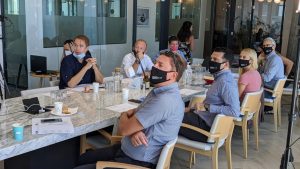
Rule #2
‘Whenever you can be outdoors, do so!’
In order to create interest in the program and change the atmosphere to maintain concentration and alertness, it is advisable to use open and ventilated spaces (while still maintaining a social distance from each other). Thus, one can enjoy the fresh air and guarantee the health of the participants.
Samsung Next at Sarona Market hosted us in their amazing open space for a sunset-happy hour panel with Israeli Government Innovation Makers, such as Nili Shalev from ISERD, Neta Gruber from Israel Innovation Authority, Ilan Fluss – MFA, Kra’el Amitai, the Israel Export Institute and Barak Gatenyo from Israeli Ministry of Science and Technology.
To end the day with a smile, we had dinner with Michal Michaeli, who welcomed us on behalf of Tel Aviv Municipality.
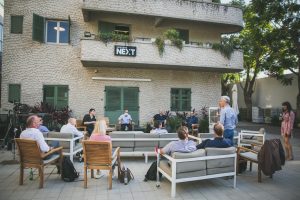
Rule #3
‘Build your agenda under conditions of uncertainty – make sure you always have plan B’.
Planning a physical event during these times is a risk. Don’t panic when something is not going as planned, make sure you set your speakers’ and participants’ expectations ahead. Ask your speakers to recommend a backup, in case they will have to be quarantined.
Be prepared to broadcast live the activities for participants who have entered quarantine (hybrid activities).
Day 2 was all about building your own Innovation road map and asking the toughest questions while we deep dove into the various domains. Uri Gafni from Quedma Innovation gave our participants a tailor-made canvas (and online template canvas for the one’s at home) that helped them define their stakeholders, goals for the week, and more.
We continued to Mind Space to hear from domain experts in the food and agrotech fields. Before the end of the day, we had a tour at Peres Center for Peace and Innovation, a must stop when talking about the Israeli ecosystem. We finished the day networking with European corporates that are successfully operating innovation hubs in Israel – SAP, ENEL, and the Volkswagen group.
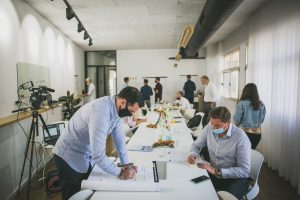
Rule #4
‘Make sure you are focusing on the unique values that a physical event can offer (that an online can’t)’.
Having a physical event means you can diversify locations, cities, and focus on cultural immersion and networking. When you are in a unique place, as we were in Haifa, make sure in advance that the places you visit comply with the MOH guidelines – for example, that an authentic restaurant near the port of Haifa will have local food that comes in personal plates, local speaker, etc.
Day 3 was dedicated to Haifa city and its inspiring inclusiveness. We settled in WeWork at the port of Haifa, met with Tamar Arava – the founder of numerous accelerators and hubs in the northern region, and got the chance to hear from some amazing speakers that represent best practices of developing regions such as, Eitan Kyiet (Road2), Jumana Nsier Hakim (Microsoft), Itzik Frid (Takwin Labs) and Inbal Rivlin & Lior Hanuka (Haifa Municipality). We also met with David Shem Tov – the leader of research and innovation at the Technion and a member of the EIT Hub Israel Board. Some of the speakers had to be in quarantine right before our arrival, therefor we shifted the plan and stayed in WeWork to have some virtual sessions.
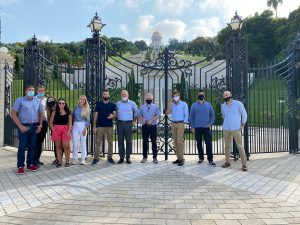
Rule #5
‘Foster 2 way-street conversations and not lectures’.
The main obstacle of online activities is that it’s hard to develop deep conversation – make a strategic plan where the online conversation is in a form of a Q&A session and less of a one-sided monologue. Make sure the speakers that connect online are displayed on a large screen, have no background noises in their household or yours, you can hear them well, and both sides have a stable internet connection. Check all of the above about half an hour before the session begins.
The last day was dedicated to the planning and drafting of how to apply all the tools the participants got to actual strategic actions.
We started the day with inspiring success stories of past diplomats and their activities in Israel. Uri Gafni returned to wrap up the workshop we started on Tuesday and to make sure each one has a put together outreach plan, and Luca Poliizi presented us Horizon 2020’s data and success stories.
To kick off the celebrations of the Jewish holidays, we ate apples with honey to bless us with a happy and sweet new year and said our good-byes for now.
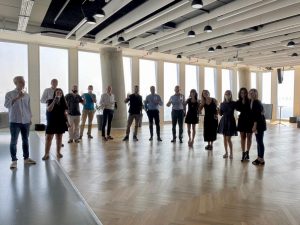
Rule #6
‘Do not expect profitability, expect Impact and Branding’
This is your chance to create buzz and inspiration. Physical events are expensive, especially if you are focusing on a smaller group and larger spaces to meet the restrictions.
The fixed costs of a delegation (buses, meeting rooms, staff investment) are shared by fewer participants because of the corona, so it makes each participant very expensive, in comparison to a normal situation of 20+ participants. BUT, it’s priceless to see how face-to-face interactions change and intensify the whole experience, for both speakers and participants.
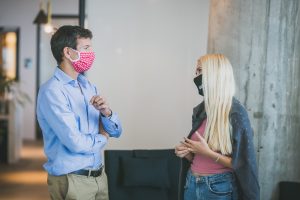
Our Golden rules for a successful in-person event during Covid-19:
#1 Keep to COVID-19 guidelines at all times
#2 Use the outdoors venues when possible
#3 Always have a plan B
#4 Keep in mind the physical event unique values vs. digital events.
#5 Focus on participant’s engagement during an online session
#6 Do not plan for profitability, there is room for creativity and inspiration